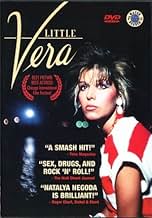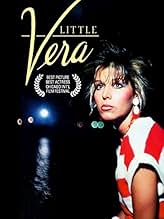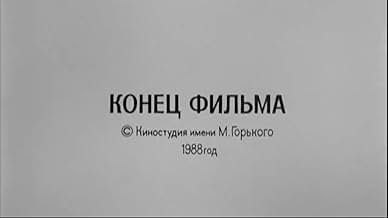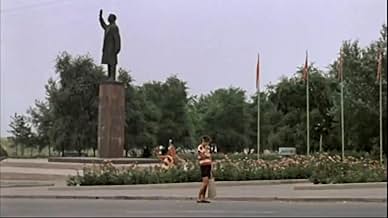PUNTUACIÓN EN IMDb
6,9/10
2,3 mil
TU PUNTUACIÓN
Añade un argumento en tu idiomaA teenage girl, who has just finished school feels trapped and aimless in her ordinary Russian family, supported by an alcoholic father, in a dull industrial town.A teenage girl, who has just finished school feels trapped and aimless in her ordinary Russian family, supported by an alcoholic father, in a dull industrial town.A teenage girl, who has just finished school feels trapped and aimless in her ordinary Russian family, supported by an alcoholic father, in a dull industrial town.
- Dirección
- Guión
- Reparto principal
- Premios
- 7 premios y 9 nominaciones en total
Aleksandr Negreba
- Viktor - brat Very
- (as Alexander Alexseyev Negreba)
Aleksandra Tabakova
- Lenka Chistyakova
- (as Alexandra Tabakova)
Gennady Goryachev
- Sledovatel
- (as G. Goryachev)
Vadim Zakharchenko
- Muzhchina v bolnichnoy palate
- (as V. Zakharchenko)
Mariya Khmelik
- podruga Viktora
- (as M. Khmelik)
Maksim Nayrabe
- brat Lenki Chistyakovoy
- (as Maxim Nairabe)
Reseñas destacadas
In Russia, the ordinary teenager Vera (Natalya Negoda) lives a leisured life with her drunkard father and her simpleton mother, without working and waiting for the calling for a technical course of telephone operator. Her brother Victor (Aleksandr Negreba) lives in Moscow with the family of his own and occasionally visits his dysfunctional family and Vera, being always motive for arguing. When Vera meets the student of university Sergei (Andrei Sokolov), they fall in love for each other and decide to get married. Sergei moves to Vera's house, but lives in conflict with her father. This relationship leads the family to a tragedy.
I have just seen "Malenkaya Vera", and I liked a lot this deep family drama. I am not familiarized with the life style in the former URSS, but there are some unusual behaviors that I found very interesting. The first one, when Victor tells Vera that she was conceived not because her parents wanted to have her, but because they wanted to move to a larger apartment. Another one, when the family goes to the beach in a truck. Many difficulties of Vera's family and their friends, the repression in the park and other situations pictured in the movie are common in Third World countries. This low budget movie is very well-directed, and the story is very profound and real. The cast has great performances and the actress Natalya Negoda is very beautiful. In the cover of the Brazilian VHS, released by Sagres distributor, there is information that Natalya Negoda was the centerfold of Playboy magazine. I am not sure how precise are the subtitles in Portuguese, since many long sentences spoken in Russian are limited to short translation in few words. My vote is seven.
Title (Brazil): "A Pequena Vera" ("The Little Vera")
I have just seen "Malenkaya Vera", and I liked a lot this deep family drama. I am not familiarized with the life style in the former URSS, but there are some unusual behaviors that I found very interesting. The first one, when Victor tells Vera that she was conceived not because her parents wanted to have her, but because they wanted to move to a larger apartment. Another one, when the family goes to the beach in a truck. Many difficulties of Vera's family and their friends, the repression in the park and other situations pictured in the movie are common in Third World countries. This low budget movie is very well-directed, and the story is very profound and real. The cast has great performances and the actress Natalya Negoda is very beautiful. In the cover of the Brazilian VHS, released by Sagres distributor, there is information that Natalya Negoda was the centerfold of Playboy magazine. I am not sure how precise are the subtitles in Portuguese, since many long sentences spoken in Russian are limited to short translation in few words. My vote is seven.
Title (Brazil): "A Pequena Vera" ("The Little Vera")
Forget every spy movie you've ever seen - this is what life was like in the USSR, and still is in many places in Russia and the ex-Soviet countries. Vera dreams of life of leisure, as she imagines the West to be; her reality is very different, with a bitter mother, a violent father, and the ever-present alcohol. And her prospects for the future are not much better. She finds a man and they try to patch up a life together, but he is afflicted by the same environment, both socially and physically - the scenery in this movie is brilliant, sitting comfortably in the company of post-apocalyptic movies but obviously done with no special effects; they have just walked in and shot whatever happened to be in front of the camera.
Forget your stereotyped, cold Russians of spy movies. This is the Real Deal: people are passionate, vibrant, and present in a way you'll never see in a drama from the West.
Forget your stereotyped, cold Russians of spy movies. This is the Real Deal: people are passionate, vibrant, and present in a way you'll never see in a drama from the West.
Little Vera is the story of a Russian teenager, her family, and her attempts to find meaning and value in a life sliding increasingly into decay. In her search for meaning, she falls in love with a more intellectual and rebellious Sergei, whose hatred for her deeply flawed parents quickly spirals out of control.
Little Vera is shocking and disturbing in nearly every way. The drinking of the father, the enabling and lack of understanding of the mother, the casual lies and misdirection of the brother, and Vera herself forgiving them all their flaws are all shocking and slightly disturbing to watch. However, the raw honesty of the film somehow manages to become even more shocking than the plot or characters. Set in cramped spaces and vast urban decay, Little Vera presented a vastly different view of Soviet life than had ever been seen before. In fact, Little Vera is a portrait of the collapse of Soviet society painted in shades of pain, desperation, and rust. It is the implosion of a family set against the implosion of an entire social order.
Although painful and desperately unsatisfying, the film itself is definitely worth seeing, if only to understand the feelings and cultures still reshaping Russia today.
Little Vera is shocking and disturbing in nearly every way. The drinking of the father, the enabling and lack of understanding of the mother, the casual lies and misdirection of the brother, and Vera herself forgiving them all their flaws are all shocking and slightly disturbing to watch. However, the raw honesty of the film somehow manages to become even more shocking than the plot or characters. Set in cramped spaces and vast urban decay, Little Vera presented a vastly different view of Soviet life than had ever been seen before. In fact, Little Vera is a portrait of the collapse of Soviet society painted in shades of pain, desperation, and rust. It is the implosion of a family set against the implosion of an entire social order.
Although painful and desperately unsatisfying, the film itself is definitely worth seeing, if only to understand the feelings and cultures still reshaping Russia today.
It's alarming, to say the least, how little the English speaking world knows about Russia's past. Everyone keeps saying Russia, but I grew up in the Soviet Union, and I can't really call it an exclusively Russian film like everyone else. Ironically, this movie was filmed in Zhdanov(Mariupol), which is now a part of Ukriane. The director chose this city because that's where he was from and he wanted to show the reality of life there. This city always been a ghetto. Now it's even worse, since that part of Ukraine is engulfed in a civil war. So the hopeless openededness of this film was right on point. Unfortunately, I have a feeling the main character would most likely die sometime in the 90's to early 2000's. Even moving wouldn't help, cause the whole area of the former Soviet Union later became a total cesspool of violent crime and drug/alcohol addiction.
During the late 80's, right before the Soviet Union collapsed, there was a plethora of similar films, but for some weird reason only this one was known outside of the country. There were films with worse sex scenes before and after this one, and unlike many other countries, there was no censorship, so TV was full of nudity at the time. So I am really confused why this was praised for a "sex scene", or "rock n' roll"(?!). This film is none of that. This era of Soviet film was actually called "Chernuha" which translates as darkness, despair, gritty. Films during this time were full of realism, had this art-house vibe and yet very genuine acting, and always had a somewhat hidden psychological or philosophical dilemma in it. Sounds like Oscar's winner Moonlight. Indeed, if Moonlight took place in the 80's Soviet Union, and instead of drugs people were drinking, it would fit right in. Some scenes are almost identical with those Soviet films. (i.e. filming a pot on a stove for a good 1 minute or so, or a character is staring at something or thinking for a long time.) I actually seen a lot of them when I was a kid, but it took me decades to watch most of them again. Many never been preserved and therefore are in a very bad shape and some I still can't find, so they were pretty much lost during the switch to the digital format. During the 90's, Russian society rejected everything from the Soviet era. Even this film would have probably been lost if it wasn't for this unusual international hype about it because of some naive sex scene.
There are some odd moments in the film that I only noticed when I watched it as an adult. There is really good and rare collector's items Italo-Disco(CC Catch) blasting from TV during the house party. A phenomena of an underground music style in North America that was only played at gay clubs, was actually a mainstream thing in the Soviet Union. Then there is a clear pedophile situation at a cafe between a man and a very young girl. Another strange scene is where Vera gets accidentally hit by a pot in the head by her drunk girlfriend with a black kid. It was also sort of disturbing to see how she was calling him names and screaming at him when she was drunk, which followed by a scene where he was alone watching a silly cartoon on TV about staying away from Africa because it has dangerous animals, while it's very obvious that life for this kid with black skin in that hell hole of a town is probably worse than being in an African jungle...
The film is as real as it gets. The life was like this for most of the Soviet Union back then. So I definitely would recommend it as a learning artifact. Also Vera means hope. So the name of the film in Russian means also "A very little hope".
During the late 80's, right before the Soviet Union collapsed, there was a plethora of similar films, but for some weird reason only this one was known outside of the country. There were films with worse sex scenes before and after this one, and unlike many other countries, there was no censorship, so TV was full of nudity at the time. So I am really confused why this was praised for a "sex scene", or "rock n' roll"(?!). This film is none of that. This era of Soviet film was actually called "Chernuha" which translates as darkness, despair, gritty. Films during this time were full of realism, had this art-house vibe and yet very genuine acting, and always had a somewhat hidden psychological or philosophical dilemma in it. Sounds like Oscar's winner Moonlight. Indeed, if Moonlight took place in the 80's Soviet Union, and instead of drugs people were drinking, it would fit right in. Some scenes are almost identical with those Soviet films. (i.e. filming a pot on a stove for a good 1 minute or so, or a character is staring at something or thinking for a long time.) I actually seen a lot of them when I was a kid, but it took me decades to watch most of them again. Many never been preserved and therefore are in a very bad shape and some I still can't find, so they were pretty much lost during the switch to the digital format. During the 90's, Russian society rejected everything from the Soviet era. Even this film would have probably been lost if it wasn't for this unusual international hype about it because of some naive sex scene.
There are some odd moments in the film that I only noticed when I watched it as an adult. There is really good and rare collector's items Italo-Disco(CC Catch) blasting from TV during the house party. A phenomena of an underground music style in North America that was only played at gay clubs, was actually a mainstream thing in the Soviet Union. Then there is a clear pedophile situation at a cafe between a man and a very young girl. Another strange scene is where Vera gets accidentally hit by a pot in the head by her drunk girlfriend with a black kid. It was also sort of disturbing to see how she was calling him names and screaming at him when she was drunk, which followed by a scene where he was alone watching a silly cartoon on TV about staying away from Africa because it has dangerous animals, while it's very obvious that life for this kid with black skin in that hell hole of a town is probably worse than being in an African jungle...
The film is as real as it gets. The life was like this for most of the Soviet Union back then. So I definitely would recommend it as a learning artifact. Also Vera means hope. So the name of the film in Russian means also "A very little hope".
This once notorious drama (at least in its own country) was hailed as a breakthrough when first released simply for daring to show modern Soviet life without the usual State-approved propaganda halo, in all its actual anti-bureaucratic grubbiness. But watching the film on this side of the erstwhile Iron Curtain only reinforces the notion that Soviet youth culture is thirty years behind the rest of the world: despite the often oppressive details it might be just another quaint teen delinquency relic from early 1960s Hollywood, dubbed into Russian and updated with casual sex and drug abuse. In other words, it's hardly a revelation to discover that Russian kids are just as misunderstood by adults as their American role models. But while the attitudes may look dated to Western audiences, it's at least an honest attempt to portray something of the boredom and defiant posturing of youth, in a country not exactly noted for addressing its generation gap.
¿Sabías que...?
- CuriosidadesThis was the first Soviet film to depict graphic sexual intercourse on screen.
- Banda sonoraHeaven And Hell
(uncredited)
Written by Dieter Bohlen
Performed by C.C. Catch
Produced by Dieter Bohlen
[plays during playback of the video clip of the same name C. C. Catch]
Selecciones populares
Inicia sesión para calificar y añadir a tu lista para recibir recomendaciones personalizadas
- How long is Little Vera?Con tecnología de Alexa
Detalles
Taquilla
- Recaudación en Estados Unidos y Canadá
- 1.262.598 US$
- Fin de semana de estreno en EE. UU. y Canadá
- 23.950 US$
- 16 abr 1989
- Recaudación en todo el mundo
- 1.262.598 US$
Contribuir a esta página
Sugerir un cambio o añadir el contenido que falta

Principal laguna de datos
By what name was La pequeña Vera (1988) officially released in India in English?
Responde





























